外研版英语九年级下册 Module 4 Rules and suggestions 模块复习课件(共62张PPT)
文档属性
| 名称 | 外研版英语九年级下册 Module 4 Rules and suggestions 模块复习课件(共62张PPT) | 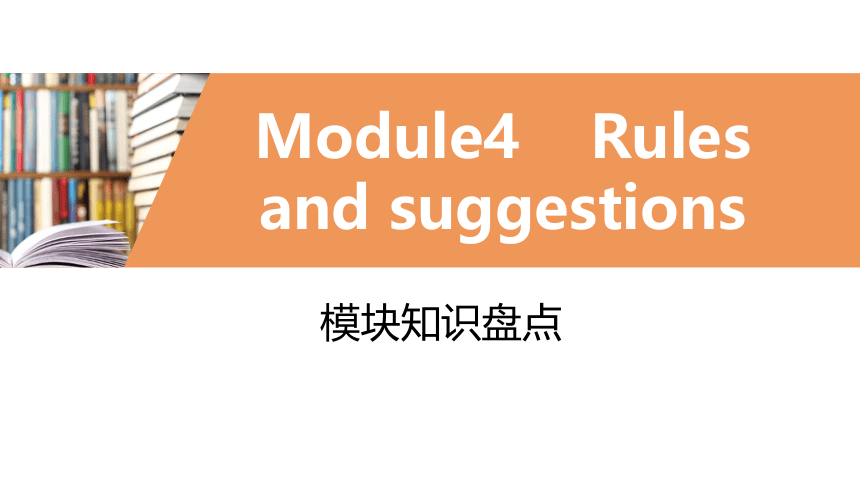 | |
| 格式 | pptx | ||
| 文件大小 | 365.4KB | ||
| 资源类型 | 教案 | ||
| 版本资源 | 外研版 | ||
| 科目 | 英语 | ||
| 更新时间 | 2022-08-29 17:46:47 | ||
图片预览

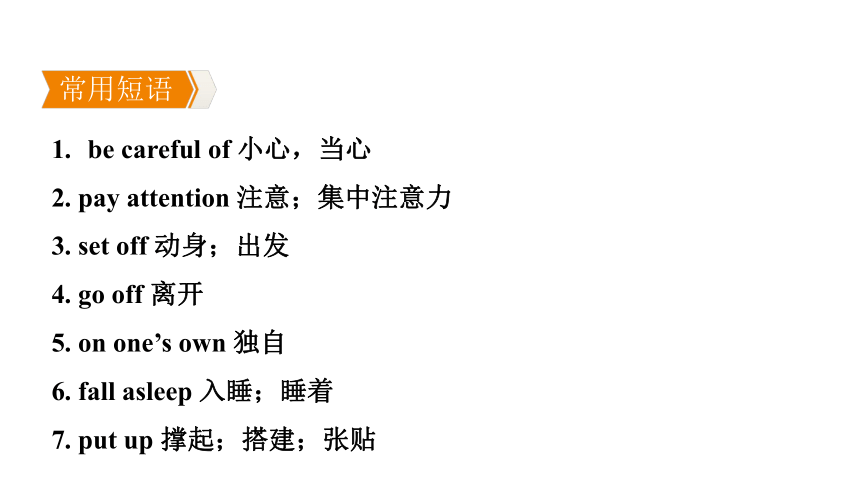
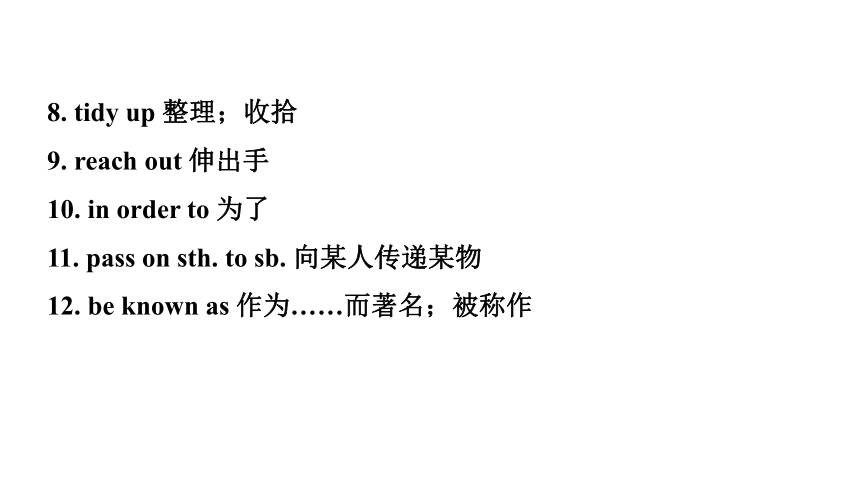
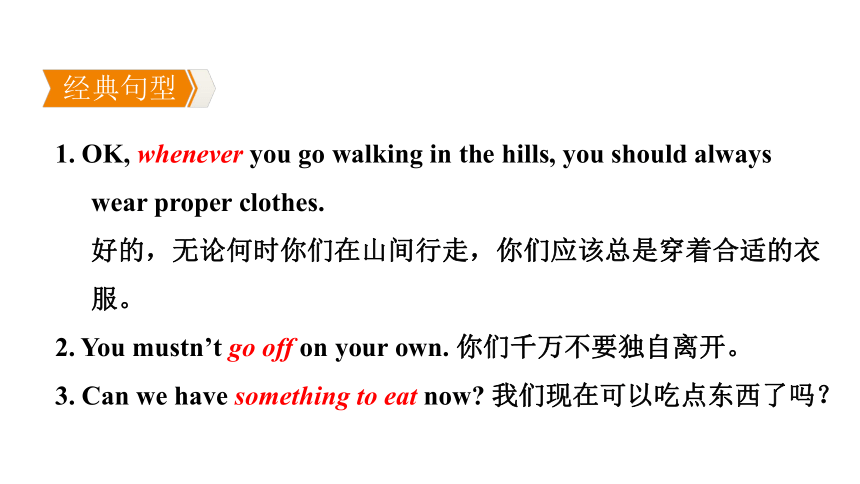
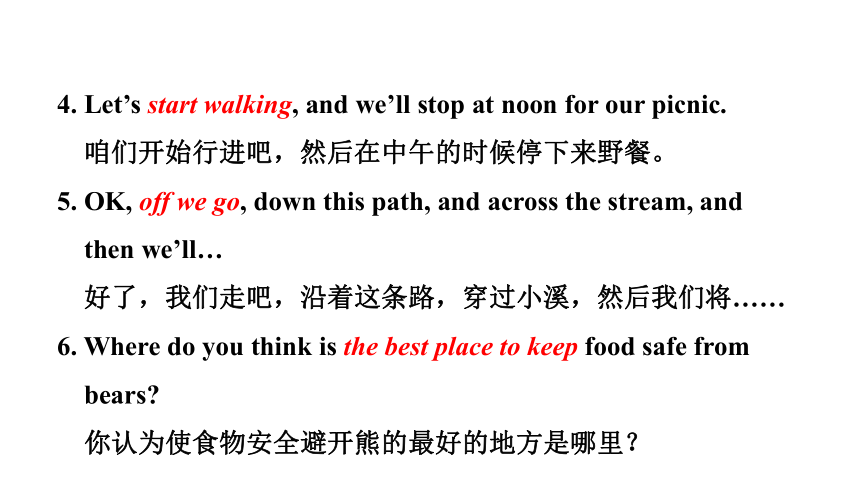
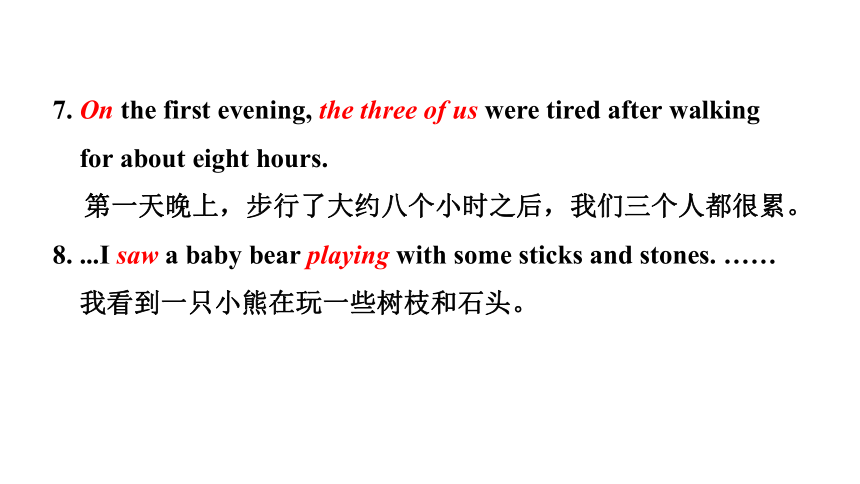
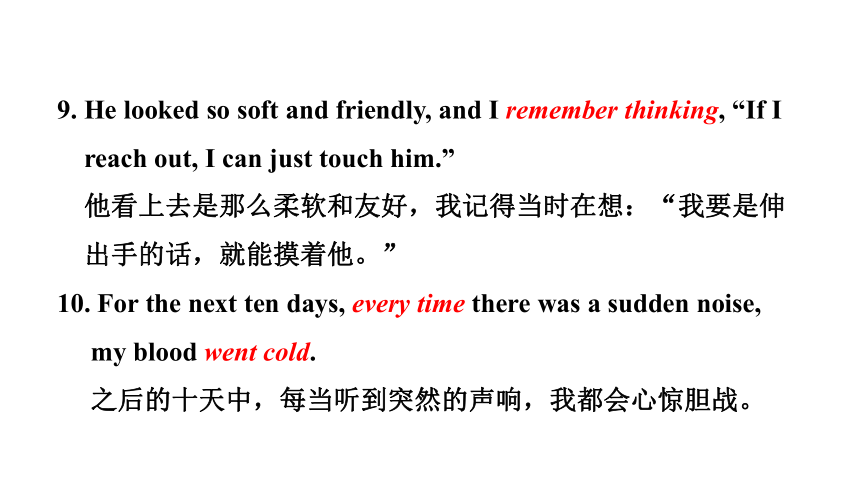
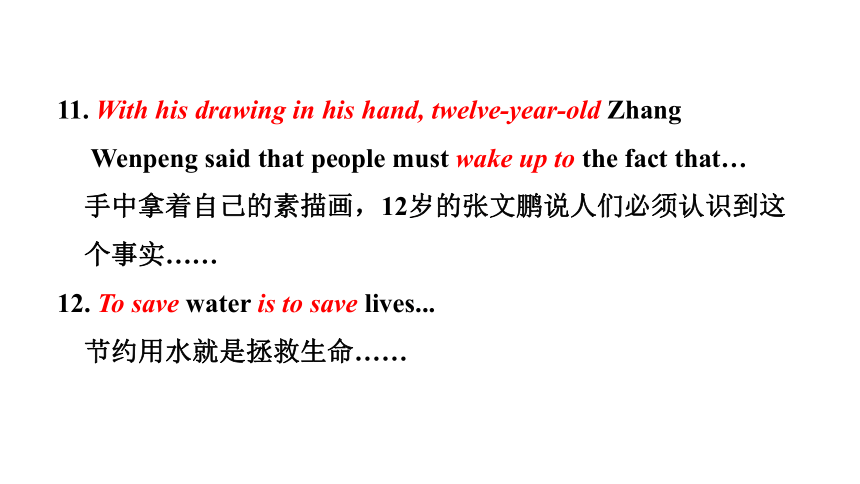

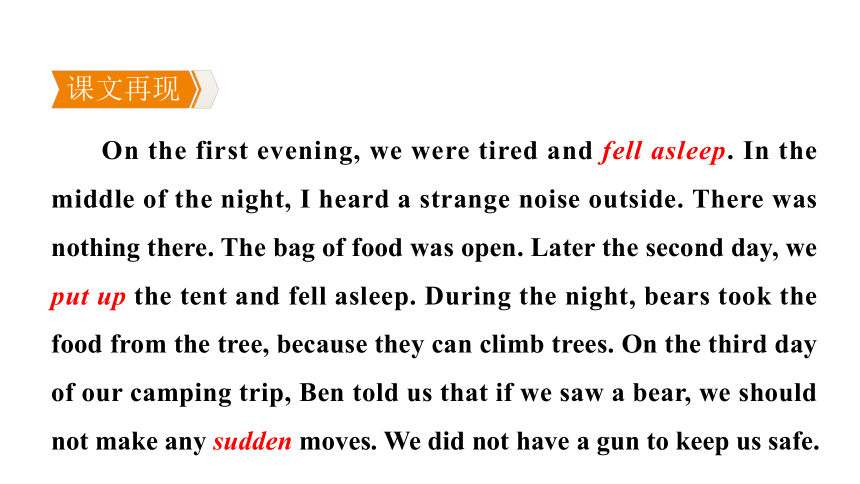
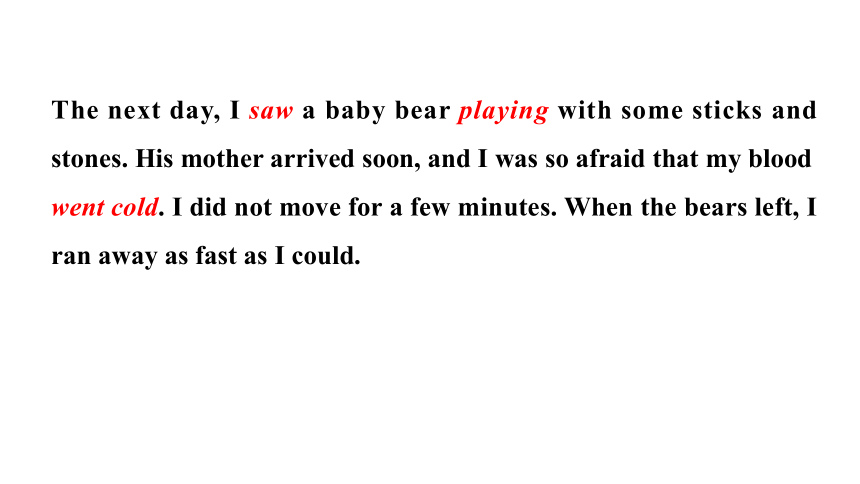

文档简介
(共62张PPT)
Module4 Rules and suggestions
模块知识盘点
常用短语
be careful of 小心,当心
2. pay attention 注意;集中注意力
3. set off 动身;出发
4. go off 离开
5. on one’s own 独自
6. fall asleep 入睡;睡着
7. put up 撑起;搭建;张贴
8. tidy up 整理;收拾
9. reach out 伸出手
10. in order to 为了
11. pass on sth. to sb. 向某人传递某物
12. be known as 作为……而著名;被称作
经典句型
1. OK, whenever you go walking in the hills, you should always wear proper clothes.
好的,无论何时你们在山间行走,你们应该总是穿着合适的衣服。
2. You mustn’t go off on your own. 你们千万不要独自离开。
3. Can we have something to eat now 我们现在可以吃点东西了吗?
4. Let’s start walking, and we’ll stop at noon for our picnic.
咱们开始行进吧,然后在中午的时候停下来野餐。
5. OK, off we go, down this path, and across the stream, and
then we’ll…
好了,我们走吧,沿着这条路,穿过小溪,然后我们将……
6. Where do you think is the best place to keep food safe from
bears
你认为使食物安全避开熊的最好的地方是哪里?
7. On the first evening, the three of us were tired after walking
for about eight hours.
第一天晚上,步行了大约八个小时之后,我们三个人都很累。
8. ...I saw a baby bear playing with some sticks and stones. ……
我看到一只小熊在玩一些树枝和石头。
9. He looked so soft and friendly, and I remember thinking, “If I
reach out, I can just touch him.”
他看上去是那么柔软和友好,我记得当时在想:“我要是伸
出手的话,就能摸着他。”
10. For the next ten days, every time there was a sudden noise,
my blood went cold.
之后的十天中,每当听到突然的声响,我都会心惊胆战。
11. With his drawing in his hand, twelve-year-old Zhang
Wenpeng said that people must wake up to the fact that…
手中拿着自己的素描画,12岁的张文鹏说人们必须认识到这
个事实……
12. To save water is to save lives...
节约用水就是拯救生命……
语法点睛
情态动词的用法,常用情态动词有can, could, may, must, need, shall, should, will, had better等。
课文再现
On the first evening, we were tired and fell asleep. In the middle of the night, I heard a strange noise outside. There was nothing there. The bag of food was open. Later the second day, we put up the tent and fell asleep. During the night, bears took the food from the tree, because they can climb trees. On the third day of our camping trip, Ben told us that if we saw a bear, we should not make any sudden moves. We did not have a gun to keep us safe.
The next day, I saw a baby bear playing with some sticks and stones. His mother arrived soon, and I was so afraid that my blood went cold. I did not move for a few minutes. When the bears left, I ran away as fast as I could.
Module 4 Rules
and suggestions
模块专题聚焦
巧品语法
语法精讲
情态动词
命题情报
情态动词是考纲明确要求学生掌握的语法项目之一,在历年中考题中多有体现,考查形式多是单项选择题。常用情态动词有can, could, may, must, need, shall,should, will, had better,其基本用法要熟练运用。答题时需认真阅读题干中的每个词,做出正确判断。
情态动词的语法特征:
1. 情态动词有一定意义,表示或暗示某种情绪或态度,表示可
能、建议、愿望、必要、允许、能力等。
2. 情态动词没有人称和数的变化,即不随主语的不同而变化。
3. 情态动词不能独立使用,必须和实义动词一起构成谓语。
4. 情态动词+ do (不带to的不定式)。
5. 情态动词没有非谓语形式,即没有不定式、分词等形式。
情态动词的类型:
1. 只作情态动词:can/could;may/might;must;ought to
2. 既作情态动词又作实义动词:need
3. 既作情态动词又作助动词:will/would;shall/should
4. 非完全情态动词:have to;used to
1can的用法
(1)表示能力,指某人具有某种技能或能力。
She can swim very fast, but I can’t.
她游泳能游得很快,但我不能。
[拓展] 比较can与be able to
can只有一般现在时和一般过去时;而be able to则有多种时态,表示将来的能力及用于完成时态时不用can,用be able to;当表示“经过努力才得以成功做某事”时,也用be able to,不用can。
He was able to work out the problem before the teacher explained it.
在老师讲解之前,他就解出了这道题。
The baby will be able to walk in two weeks.
两周后宝宝就要会走了。
(2)表示请求或许可,与may意思相近。
—Can/May I have a look 我能看一下吗?
—Yes, you can./No, you can’t./No, I’m afraid not.
是的,可以。/不,不行。/不,恐怕不行。
(3)表示推测,意为“可能”,常用在否定句和疑问句中,其否定形式为can’t,意为“不可能”。
—Can the news be true 这则新闻是真的吗?
—No, it can’t be true. 不,它不可能是真的。
(4)表示惊异、怀疑或不理解等。
How can you be so rude 你怎能如此无礼?
2could的用法
(1)could为can的过去式,意为“能,会”,表示过去的能力。
He could write poems when he was 10.
他10岁时就会写诗了。
(2)could用在疑问句中,表示委婉的语气,希望得到对方的肯定回答,此时could不表示过去。
—Could I use your pen 我可以用你的钢笔吗?
—Yes, you can. 是的,可以。(注意回答时用can)
3may的用法
(1)表示请求、许可,比can正式。
—May I borrow your bike
我可以借用你的自行车吗?
—Yes, you can./Yes, please. 是的,可以。
—No, you can’t./No, you mustn’t./Please don’t.
不,不行。
[注意] 用“May I... ”较正式和客气,而口语中多用“Can I... ”
(2)表示推测,谈论可能性,意为“可能,或许”,一般用于肯定句。
It may rain tomorrow. 明天可能下雨。
(3)may的过去式为might,might表示推测时,可能性小于may。
He is absent from school. He might be sick.
他没来上学。他可能生病了。
(4)表示希望、祈求、祝愿,可译为“祝愿”,通常用在“may+主语+动词原形”结构中。
May you succeed!祝你成功!
4must的用法
(1)must表示主观看法,意为“必须,一定”。
Must I hand in my homework right now
我必须现在交家庭作业吗?
(2)must的否定形式为mustn’t,意为“一定不要,千万别,禁止,不许”。
You mustn’t play with fire. 你不准玩火。
(3)must引导的疑问句,肯定回答用must,否定回答用needn’t或don’t have to。
—Must I finish my homework today
我必须今天完成我的家庭作业吗?
—No, you needn’t/don’t have to. 不,你不必。
(4)must表示有把握的推测,用于肯定句。
The light is on, so he must be at home now.
灯亮着,所以他现在一定在家。
[拓展] 比较have to与must
①两词都是“必须”的意思,have to表示客观的需要, must表示说话人的主观看法、主观必要。
My brother was very ill, so I had to call the doctor at midnight. (客观上)
我哥哥病得很严重,所以我不得不半夜给医生打电话。
He said that they must work hard. (主观上)
他说他们必须努力工作。
②have to有人称、数和时态的变化,而must只有一种形式。
He had to look after his sister yesterday.
昨天他不得不照顾他的妹妹。
③在否定结构中,don’t have to 表示“不必”(=needn’t),而mustn’t表示“禁止,不允许”。
You don’t have to tell him about it.
你不必把此事告诉他。
You mustn’t tell him about it.你一定不要把这件事告诉他。
5need的用法
(1)need意为“需要”,作情态动词时多用于否定句和疑问句,其否定形式为needn’t,意为“没有必要,不必”。用need提问时,肯定回答常用must,否定回答常用needn’t或don’t have to。
—Need I stay here any longer
需要我在这里待下去吗?
—Yes, you must. 是的,你必须。
(2)need还可以作实义动词,此时有人称、数和时态的变化。如果是人作主语,后面多接动词不定式;如果是物作主语,一般用need doing或need tobe done结构。
I need to do it right now. 我需要现在做它。
The door needs painting. 这扇门需要刷油漆了。
6shall的用法
shall表示征求对方的意见,多用于第一人称。
Shall we go out for a walk 我们出去散步好吗?
7should的用法
(1)should意为“应该”,可表示劝告、建议、义务、责任等。
We should protect the environment.
我们应该保护环境。
(2)should have done表示“过去本应该做而实际上未做”,含有责备或后悔的意味。
You should have finished your homework.
你本应该完成你的家庭作业。
8will的用法
will表示意愿、意志、打算,可用于多种人称。
I will help you if I’m free this afternoon.
如果我今天下午有空,就会帮你。
9had better的用法
had better意为“最好”,没有人称的变化,后接不带to的不定式,其否定形式为had better not。
We had better go now. 我们最好现在去。
1. |宁夏中考|—Can I go swimming, Mum
—Certainly. But you ______be back by four.
A. can B. may
C. might D. must
考点直击
D
【解析】 句意:“妈妈,我可以去游泳吗 ”“当然可以,但是你必须在四点前回来。”must意为“必须”。故选D。
2. |成都中考|This pair of glasses ______ be Tony’s .
He’s the only one who wears glasses.
A. must B. might C. can’t
A
3. |威海中考|—Bob, where is Linda
—She ______ be in the library. But I am not sure.
A. must B. may
C. need D. has to
B
【解析】 根据“But I am not sure.”可知选B。may 表示不太肯定的推测。
4. |齐齐哈尔中考|— ______I finish my work now
—No, you ______. You can do it later.
A. May; needn’t
B. Must; don’t have to
C. Can; couldn’t
B
5. |山西中考|—Many people play with mobile phones all day instead of reading books.
—That’s too bad. Everyone ______ be a book lover.
Reading is more enjoyable.
A. may B. should C. would
B
【解析】 考查情态动词的用法辨析。句意:“许多人整天玩手机而不看书。”“太糟了。每个人都应当成为书的爱好者。读书更快乐。” may意为“可能”;should意为“应当”;would意为“将会”。根据句意可知选B。
6. |河南中考|—Are you going to the cinema tonight
—I don’t know. I ______ go or I ______ stay at home.
A. will; will B. must; must
C. should; should D. might; might
7. |武汉中考|—Honey, stay home before I return.
—I ______, Mum.
A. must B. can
C. will D. should
D
C
8. |丽水中考|Here is my phone number. You ______ call me any time you like.
A. must B. can
C. should D. need
B
9. |云南中考|We ______ use mobile phones when the plane takes off.
A. may not B. shouldn’t
C. needn’t D. mustn’t
D
【解析】 mustn’t表示“禁止”。
10. |贵港中考|The girl in the classroom ______ be Mary. She called me from Beijing just now.
A. mustn’t B. needn’t
C. shouldn’t D. can’t
D
谈论规则和建议及发表自己的观点
本模块的核心话题是“谈论规则和建议,发表自己的观点”。常见的命题形式:根据文字提示和生活实际情况讲述身边的规则,必要时发表自己的观点;就某一社会不良现象发表看法,并就此谈论遵守社会规则的重要性。
妙解写作
写 作 案 例
假如你是李华,你的好朋友 Lisa 不久前参加达人秀节目被淘汰了,她为这次失败所困扰,无心学习。请你给她写一封电子邮件,建议她正确地看待达人秀节目,享受参与的过程而不必太在意结果;提醒她实现梦想的途径有很多,只有努力才能获得成功;鼓励她好好学习,也不放弃个人爱好,开心地度过每一天。
要求:邮件包含以上所有要点,可适当增加细节,以使行文连贯;80词左右。
_____________________________________________________________________________________________________________________________________________________________________________________________________________________________________________________________________________________________
素 材 积 累
词汇库
failure 失败 success 成功
process 过程 result 结果
opinion 观点 treat 对待
meanwhile 同时 relax 放松
短语箱
feel down 感觉失落 talent show 才艺表演
from my point of view 在我看来
in a proper way 用一个正确的方法
come true 实现 as long as 只要
last but not least 最后但同样重要的
give up 放弃
句式链
① From my point of view, you should... 我认为,你应该……
② What should you do if… 如果……,你应该怎么做?
③ If…, you should… 如果……,你应该……
④ Don’t… 不要……
⑤ We can’t…we should… 我们不能……,我们应该……
⑥ As long as you..., you can...只要……,你就能……
⑦ Here are some of my opinions. 这是我的一些观点。
五 步 妙 解
审
体裁 应用文 话题 给朋友提建议
时态 一般现在时 人称 第二人称
段落 布局 开头:简述问题。 主体:提出建议。 结尾:表达祝愿。 谴
(1)You work hard. You can make your dreams come true.
把以上两个句子用as long as合并: _____________________________________________________
(2)根据汉语意思补全句子:
①失败是成功之母。Failure is the _________________________
②你应该用一个正确的方式对待它。 You should treat it
_____________________________________________________
As long as you work hard, you can make your dreams come true.
mother of success
in a proper way
模
简述问题
提出建议
表达祝愿
I’m sorry to hear that... Here are...
From my point of view, you should treat it... You can learn a lot from the show. As long as you work hard, you can... Last but not least, … Meanwhile, there is no need to... Just...!
Hope you’ll be happy every day!
Dear Lisa,
I’m sorry to hear that you are feeling down because of your failure in the talent show. From my point of view, you should treat it in a proper way, and enjoy the process instead of the result. Besides, there are many ways to realise our dreams. As the saying goes, failure is the mother of success. You can learn a lot from the talent show. As long as you work hard, you can make your dreams come
润
true. Last but not least, as a student, you should study hard first. Meanwhile, there is no need to give up your hobbies. Just relax and have fun!
Hope you’ll be happy every day!
Yours,
Li Hua
润
点
本篇文章条理清晰,结构合理。开篇简述问题,然后提出建议和观点。文章还引用了格言“Failure is the mother of success”,短语as long as, last but not least等的运用,都说明作者词汇量丰富,语言功底深厚。
小 试 身 手
最近媒体对“中国式过马路”这一现象进行了尖锐的批评,请你以一名中学生的身份写一篇英语短文,对“中国式过马路”这一现象加以评述。80词左右。开头已给出,不计入总词数。
现象 很多人过马路时不看红绿灯
原因 缺乏交通安全意识;匆忙赶时间
措施 遵守交通规则;(你自己的建议)……
参考词汇:
交通灯 traffic lights;
缺乏交通安全意识 lack traffic safety awareness;
遵守交通规则 obey the traffic rules
One possible version:
Chinese Style of Crossing Streets
Chinese style of crossing streets has been a hot topic on the Internet recently.Nowadays, many Chinese people cross streets without looking at the traffic lights. Why I think there are two main reasons. Some people lack traffic safety awareness. Besides, some people are in a hurry so they don’t want to wait for the green lights. However, it has brought danger to themselves as well as to others. So I think something must be done to avoid traffic accidents. For example, whoever breaks the traffic rules should be punished.
As middle school students, we should obey the traffic rules. What’s more, we can try our best to advise people to obey the rules. Only in this way can we keep ourselves safe.
词义猜测法”解阅读理解题
“词义猜测法”是指在阅读过程中根据对语篇的信息、逻辑、背景知识及语言结构等的综合理解去猜测或推断某一生词、难词或关键词的意义。它是一种非常有用的阅读技巧。通过上下文提供的线索或生词本身的结构特点对词义做出正确判断,能提高学生的阅读速度和阅读能力。“词义猜测法”的解题技巧:
培优课堂
1. 利用前后文情境(解释、举例、暗示、指代、因果关系、前后对比等)。
2. 利用构词法(派生、合成、转化等)。
3. 利用个人经验和常识。
【典例】
What is a ladylike girl Look at these students’ opinions.
Wu Yifan of Dalian, Liaoning: A ladylike girl is gentle and quiet. But she’s not shy; she’s not afraid of expressing herself. She is kind and beautiful. To me, actress Dong Jie is a lady. She is pretty and gentle. She also has a kind heart. She does a lot for charity.
Wang Lichao of Tianjin: A ladylike girl is not just pretty-looking but wise too. She never says rude words. She is not noisy. She is always calm and at ease. There aren’t any real ladies in my class, I think. Most of the girls are of a style I call “wild beauties”.
【解析】 “A ladylike girl is not just pretty-looking but wise too. She never says rude words. She is not noisy. She is always calm and at ease.” 描述了淑女的特点,她不仅漂亮而且聪明,她很少说粗鲁的话,很沉静而且大方。
根据上下文的解释和举例可知选C。
【题目】
What do the underlined words “at ease” mean in the passage
A. 容易 B. 粗鲁 C. 大方 D. 木讷
【答案】 C
谢 谢 观 看!
Module4 Rules and suggestions
模块知识盘点
常用短语
be careful of 小心,当心
2. pay attention 注意;集中注意力
3. set off 动身;出发
4. go off 离开
5. on one’s own 独自
6. fall asleep 入睡;睡着
7. put up 撑起;搭建;张贴
8. tidy up 整理;收拾
9. reach out 伸出手
10. in order to 为了
11. pass on sth. to sb. 向某人传递某物
12. be known as 作为……而著名;被称作
经典句型
1. OK, whenever you go walking in the hills, you should always wear proper clothes.
好的,无论何时你们在山间行走,你们应该总是穿着合适的衣服。
2. You mustn’t go off on your own. 你们千万不要独自离开。
3. Can we have something to eat now 我们现在可以吃点东西了吗?
4. Let’s start walking, and we’ll stop at noon for our picnic.
咱们开始行进吧,然后在中午的时候停下来野餐。
5. OK, off we go, down this path, and across the stream, and
then we’ll…
好了,我们走吧,沿着这条路,穿过小溪,然后我们将……
6. Where do you think is the best place to keep food safe from
bears
你认为使食物安全避开熊的最好的地方是哪里?
7. On the first evening, the three of us were tired after walking
for about eight hours.
第一天晚上,步行了大约八个小时之后,我们三个人都很累。
8. ...I saw a baby bear playing with some sticks and stones. ……
我看到一只小熊在玩一些树枝和石头。
9. He looked so soft and friendly, and I remember thinking, “If I
reach out, I can just touch him.”
他看上去是那么柔软和友好,我记得当时在想:“我要是伸
出手的话,就能摸着他。”
10. For the next ten days, every time there was a sudden noise,
my blood went cold.
之后的十天中,每当听到突然的声响,我都会心惊胆战。
11. With his drawing in his hand, twelve-year-old Zhang
Wenpeng said that people must wake up to the fact that…
手中拿着自己的素描画,12岁的张文鹏说人们必须认识到这
个事实……
12. To save water is to save lives...
节约用水就是拯救生命……
语法点睛
情态动词的用法,常用情态动词有can, could, may, must, need, shall, should, will, had better等。
课文再现
On the first evening, we were tired and fell asleep. In the middle of the night, I heard a strange noise outside. There was nothing there. The bag of food was open. Later the second day, we put up the tent and fell asleep. During the night, bears took the food from the tree, because they can climb trees. On the third day of our camping trip, Ben told us that if we saw a bear, we should not make any sudden moves. We did not have a gun to keep us safe.
The next day, I saw a baby bear playing with some sticks and stones. His mother arrived soon, and I was so afraid that my blood went cold. I did not move for a few minutes. When the bears left, I ran away as fast as I could.
Module 4 Rules
and suggestions
模块专题聚焦
巧品语法
语法精讲
情态动词
命题情报
情态动词是考纲明确要求学生掌握的语法项目之一,在历年中考题中多有体现,考查形式多是单项选择题。常用情态动词有can, could, may, must, need, shall,should, will, had better,其基本用法要熟练运用。答题时需认真阅读题干中的每个词,做出正确判断。
情态动词的语法特征:
1. 情态动词有一定意义,表示或暗示某种情绪或态度,表示可
能、建议、愿望、必要、允许、能力等。
2. 情态动词没有人称和数的变化,即不随主语的不同而变化。
3. 情态动词不能独立使用,必须和实义动词一起构成谓语。
4. 情态动词+ do (不带to的不定式)。
5. 情态动词没有非谓语形式,即没有不定式、分词等形式。
情态动词的类型:
1. 只作情态动词:can/could;may/might;must;ought to
2. 既作情态动词又作实义动词:need
3. 既作情态动词又作助动词:will/would;shall/should
4. 非完全情态动词:have to;used to
1can的用法
(1)表示能力,指某人具有某种技能或能力。
She can swim very fast, but I can’t.
她游泳能游得很快,但我不能。
[拓展] 比较can与be able to
can只有一般现在时和一般过去时;而be able to则有多种时态,表示将来的能力及用于完成时态时不用can,用be able to;当表示“经过努力才得以成功做某事”时,也用be able to,不用can。
He was able to work out the problem before the teacher explained it.
在老师讲解之前,他就解出了这道题。
The baby will be able to walk in two weeks.
两周后宝宝就要会走了。
(2)表示请求或许可,与may意思相近。
—Can/May I have a look 我能看一下吗?
—Yes, you can./No, you can’t./No, I’m afraid not.
是的,可以。/不,不行。/不,恐怕不行。
(3)表示推测,意为“可能”,常用在否定句和疑问句中,其否定形式为can’t,意为“不可能”。
—Can the news be true 这则新闻是真的吗?
—No, it can’t be true. 不,它不可能是真的。
(4)表示惊异、怀疑或不理解等。
How can you be so rude 你怎能如此无礼?
2could的用法
(1)could为can的过去式,意为“能,会”,表示过去的能力。
He could write poems when he was 10.
他10岁时就会写诗了。
(2)could用在疑问句中,表示委婉的语气,希望得到对方的肯定回答,此时could不表示过去。
—Could I use your pen 我可以用你的钢笔吗?
—Yes, you can. 是的,可以。(注意回答时用can)
3may的用法
(1)表示请求、许可,比can正式。
—May I borrow your bike
我可以借用你的自行车吗?
—Yes, you can./Yes, please. 是的,可以。
—No, you can’t./No, you mustn’t./Please don’t.
不,不行。
[注意] 用“May I... ”较正式和客气,而口语中多用“Can I... ”
(2)表示推测,谈论可能性,意为“可能,或许”,一般用于肯定句。
It may rain tomorrow. 明天可能下雨。
(3)may的过去式为might,might表示推测时,可能性小于may。
He is absent from school. He might be sick.
他没来上学。他可能生病了。
(4)表示希望、祈求、祝愿,可译为“祝愿”,通常用在“may+主语+动词原形”结构中。
May you succeed!祝你成功!
4must的用法
(1)must表示主观看法,意为“必须,一定”。
Must I hand in my homework right now
我必须现在交家庭作业吗?
(2)must的否定形式为mustn’t,意为“一定不要,千万别,禁止,不许”。
You mustn’t play with fire. 你不准玩火。
(3)must引导的疑问句,肯定回答用must,否定回答用needn’t或don’t have to。
—Must I finish my homework today
我必须今天完成我的家庭作业吗?
—No, you needn’t/don’t have to. 不,你不必。
(4)must表示有把握的推测,用于肯定句。
The light is on, so he must be at home now.
灯亮着,所以他现在一定在家。
[拓展] 比较have to与must
①两词都是“必须”的意思,have to表示客观的需要, must表示说话人的主观看法、主观必要。
My brother was very ill, so I had to call the doctor at midnight. (客观上)
我哥哥病得很严重,所以我不得不半夜给医生打电话。
He said that they must work hard. (主观上)
他说他们必须努力工作。
②have to有人称、数和时态的变化,而must只有一种形式。
He had to look after his sister yesterday.
昨天他不得不照顾他的妹妹。
③在否定结构中,don’t have to 表示“不必”(=needn’t),而mustn’t表示“禁止,不允许”。
You don’t have to tell him about it.
你不必把此事告诉他。
You mustn’t tell him about it.你一定不要把这件事告诉他。
5need的用法
(1)need意为“需要”,作情态动词时多用于否定句和疑问句,其否定形式为needn’t,意为“没有必要,不必”。用need提问时,肯定回答常用must,否定回答常用needn’t或don’t have to。
—Need I stay here any longer
需要我在这里待下去吗?
—Yes, you must. 是的,你必须。
(2)need还可以作实义动词,此时有人称、数和时态的变化。如果是人作主语,后面多接动词不定式;如果是物作主语,一般用need doing或need tobe done结构。
I need to do it right now. 我需要现在做它。
The door needs painting. 这扇门需要刷油漆了。
6shall的用法
shall表示征求对方的意见,多用于第一人称。
Shall we go out for a walk 我们出去散步好吗?
7should的用法
(1)should意为“应该”,可表示劝告、建议、义务、责任等。
We should protect the environment.
我们应该保护环境。
(2)should have done表示“过去本应该做而实际上未做”,含有责备或后悔的意味。
You should have finished your homework.
你本应该完成你的家庭作业。
8will的用法
will表示意愿、意志、打算,可用于多种人称。
I will help you if I’m free this afternoon.
如果我今天下午有空,就会帮你。
9had better的用法
had better意为“最好”,没有人称的变化,后接不带to的不定式,其否定形式为had better not。
We had better go now. 我们最好现在去。
1. |宁夏中考|—Can I go swimming, Mum
—Certainly. But you ______be back by four.
A. can B. may
C. might D. must
考点直击
D
【解析】 句意:“妈妈,我可以去游泳吗 ”“当然可以,但是你必须在四点前回来。”must意为“必须”。故选D。
2. |成都中考|This pair of glasses ______ be Tony’s .
He’s the only one who wears glasses.
A. must B. might C. can’t
A
3. |威海中考|—Bob, where is Linda
—She ______ be in the library. But I am not sure.
A. must B. may
C. need D. has to
B
【解析】 根据“But I am not sure.”可知选B。may 表示不太肯定的推测。
4. |齐齐哈尔中考|— ______I finish my work now
—No, you ______. You can do it later.
A. May; needn’t
B. Must; don’t have to
C. Can; couldn’t
B
5. |山西中考|—Many people play with mobile phones all day instead of reading books.
—That’s too bad. Everyone ______ be a book lover.
Reading is more enjoyable.
A. may B. should C. would
B
【解析】 考查情态动词的用法辨析。句意:“许多人整天玩手机而不看书。”“太糟了。每个人都应当成为书的爱好者。读书更快乐。” may意为“可能”;should意为“应当”;would意为“将会”。根据句意可知选B。
6. |河南中考|—Are you going to the cinema tonight
—I don’t know. I ______ go or I ______ stay at home.
A. will; will B. must; must
C. should; should D. might; might
7. |武汉中考|—Honey, stay home before I return.
—I ______, Mum.
A. must B. can
C. will D. should
D
C
8. |丽水中考|Here is my phone number. You ______ call me any time you like.
A. must B. can
C. should D. need
B
9. |云南中考|We ______ use mobile phones when the plane takes off.
A. may not B. shouldn’t
C. needn’t D. mustn’t
D
【解析】 mustn’t表示“禁止”。
10. |贵港中考|The girl in the classroom ______ be Mary. She called me from Beijing just now.
A. mustn’t B. needn’t
C. shouldn’t D. can’t
D
谈论规则和建议及发表自己的观点
本模块的核心话题是“谈论规则和建议,发表自己的观点”。常见的命题形式:根据文字提示和生活实际情况讲述身边的规则,必要时发表自己的观点;就某一社会不良现象发表看法,并就此谈论遵守社会规则的重要性。
妙解写作
写 作 案 例
假如你是李华,你的好朋友 Lisa 不久前参加达人秀节目被淘汰了,她为这次失败所困扰,无心学习。请你给她写一封电子邮件,建议她正确地看待达人秀节目,享受参与的过程而不必太在意结果;提醒她实现梦想的途径有很多,只有努力才能获得成功;鼓励她好好学习,也不放弃个人爱好,开心地度过每一天。
要求:邮件包含以上所有要点,可适当增加细节,以使行文连贯;80词左右。
_____________________________________________________________________________________________________________________________________________________________________________________________________________________________________________________________________________________________
素 材 积 累
词汇库
failure 失败 success 成功
process 过程 result 结果
opinion 观点 treat 对待
meanwhile 同时 relax 放松
短语箱
feel down 感觉失落 talent show 才艺表演
from my point of view 在我看来
in a proper way 用一个正确的方法
come true 实现 as long as 只要
last but not least 最后但同样重要的
give up 放弃
句式链
① From my point of view, you should... 我认为,你应该……
② What should you do if… 如果……,你应该怎么做?
③ If…, you should… 如果……,你应该……
④ Don’t… 不要……
⑤ We can’t…we should… 我们不能……,我们应该……
⑥ As long as you..., you can...只要……,你就能……
⑦ Here are some of my opinions. 这是我的一些观点。
五 步 妙 解
审
体裁 应用文 话题 给朋友提建议
时态 一般现在时 人称 第二人称
段落 布局 开头:简述问题。 主体:提出建议。 结尾:表达祝愿。 谴
(1)You work hard. You can make your dreams come true.
把以上两个句子用as long as合并: _____________________________________________________
(2)根据汉语意思补全句子:
①失败是成功之母。Failure is the _________________________
②你应该用一个正确的方式对待它。 You should treat it
_____________________________________________________
As long as you work hard, you can make your dreams come true.
mother of success
in a proper way
模
简述问题
提出建议
表达祝愿
I’m sorry to hear that... Here are...
From my point of view, you should treat it... You can learn a lot from the show. As long as you work hard, you can... Last but not least, … Meanwhile, there is no need to... Just...!
Hope you’ll be happy every day!
Dear Lisa,
I’m sorry to hear that you are feeling down because of your failure in the talent show. From my point of view, you should treat it in a proper way, and enjoy the process instead of the result. Besides, there are many ways to realise our dreams. As the saying goes, failure is the mother of success. You can learn a lot from the talent show. As long as you work hard, you can make your dreams come
润
true. Last but not least, as a student, you should study hard first. Meanwhile, there is no need to give up your hobbies. Just relax and have fun!
Hope you’ll be happy every day!
Yours,
Li Hua
润
点
本篇文章条理清晰,结构合理。开篇简述问题,然后提出建议和观点。文章还引用了格言“Failure is the mother of success”,短语as long as, last but not least等的运用,都说明作者词汇量丰富,语言功底深厚。
小 试 身 手
最近媒体对“中国式过马路”这一现象进行了尖锐的批评,请你以一名中学生的身份写一篇英语短文,对“中国式过马路”这一现象加以评述。80词左右。开头已给出,不计入总词数。
现象 很多人过马路时不看红绿灯
原因 缺乏交通安全意识;匆忙赶时间
措施 遵守交通规则;(你自己的建议)……
参考词汇:
交通灯 traffic lights;
缺乏交通安全意识 lack traffic safety awareness;
遵守交通规则 obey the traffic rules
One possible version:
Chinese Style of Crossing Streets
Chinese style of crossing streets has been a hot topic on the Internet recently.Nowadays, many Chinese people cross streets without looking at the traffic lights. Why I think there are two main reasons. Some people lack traffic safety awareness. Besides, some people are in a hurry so they don’t want to wait for the green lights. However, it has brought danger to themselves as well as to others. So I think something must be done to avoid traffic accidents. For example, whoever breaks the traffic rules should be punished.
As middle school students, we should obey the traffic rules. What’s more, we can try our best to advise people to obey the rules. Only in this way can we keep ourselves safe.
词义猜测法”解阅读理解题
“词义猜测法”是指在阅读过程中根据对语篇的信息、逻辑、背景知识及语言结构等的综合理解去猜测或推断某一生词、难词或关键词的意义。它是一种非常有用的阅读技巧。通过上下文提供的线索或生词本身的结构特点对词义做出正确判断,能提高学生的阅读速度和阅读能力。“词义猜测法”的解题技巧:
培优课堂
1. 利用前后文情境(解释、举例、暗示、指代、因果关系、前后对比等)。
2. 利用构词法(派生、合成、转化等)。
3. 利用个人经验和常识。
【典例】
What is a ladylike girl Look at these students’ opinions.
Wu Yifan of Dalian, Liaoning: A ladylike girl is gentle and quiet. But she’s not shy; she’s not afraid of expressing herself. She is kind and beautiful. To me, actress Dong Jie is a lady. She is pretty and gentle. She also has a kind heart. She does a lot for charity.
Wang Lichao of Tianjin: A ladylike girl is not just pretty-looking but wise too. She never says rude words. She is not noisy. She is always calm and at ease. There aren’t any real ladies in my class, I think. Most of the girls are of a style I call “wild beauties”.
【解析】 “A ladylike girl is not just pretty-looking but wise too. She never says rude words. She is not noisy. She is always calm and at ease.” 描述了淑女的特点,她不仅漂亮而且聪明,她很少说粗鲁的话,很沉静而且大方。
根据上下文的解释和举例可知选C。
【题目】
What do the underlined words “at ease” mean in the passage
A. 容易 B. 粗鲁 C. 大方 D. 木讷
【答案】 C
谢 谢 观 看!
同课章节目录
- Module 1 Travel
- Unit 1 We toured the city by bus and by taxi
- Unit 2 It's a long story.
- Unit 3 Language in use
- Module 2 Education
- Unit 1 They don't sit in rows.
- Unit 2 What do I like best about school?
- Unit 3 Language in use
- Module 3 Life now and then
- Unit 1 They sometimes work harder.
- Unit 2 I think life is better today.
- Unit 3 Language in use.
- Module 4 Rules and suggestions
- Unit 1 You must be careful of falling stones.
- Unit 2 we must keep the camp clean.
- Unit 3 Language in use.
- Revison A
- Module 5 Look after yourself
- Unit 1 We'd better get you to hospital.
- Unit 2 Get off the sofa!
- Unit 3 Language in use.
- Module 6 Eating togethe
- Unit 1 When is the school-leavers' party?
- Unit 2 Knives and forks are used for most Western
- Unit 3 Language in use
- Module 7 English for you and me
- Unit 1 Have you ever been to an English corner?
- Unit 2 We all own English.
- Unit 3 Language in use
- Module 8 My future life
- Unit 1 Here's to our friendship and the future
- Unit 2 I know that you will be better at maths.
- Unit 3 Language in use
- Revison B
